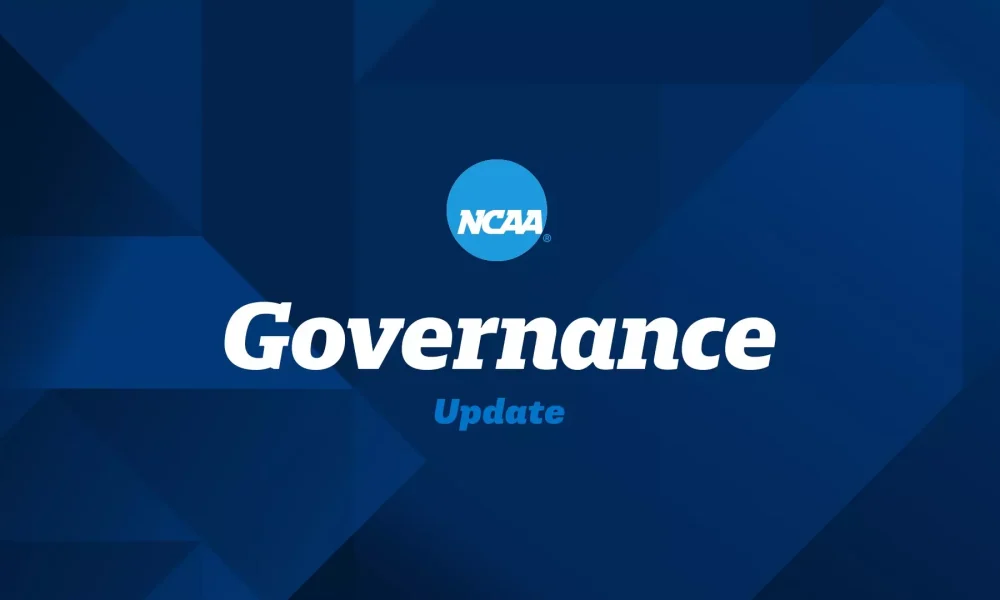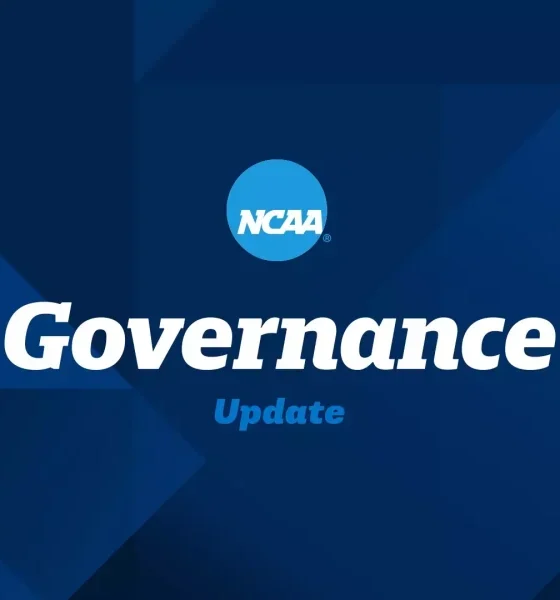

Compliance Updates
New Initiative from DI Council Aims to Enable Betting on Professional Sports
The Division I Council introduced a proposal that, if adopted in October, would change sports betting rules to permit student-athletes and staff members to bet on professional sports and refocus the Association’s enforcement efforts on college sports betting and behaviors that directly impact game integrity. If adopted, the change will be implemented only if Divisions II and III also vote to allow betting on pro sports.
The council’s introduction of the proposal, which comes after a directive from the Division I Board of Directors in April that the council adopt changes to sports betting rules, is not an endorsement of sports betting behaviors, especially for college athletes. The NCAA’s prohibition against betting on college sports would remain in place, as would the prohibitions against sharing information about college events with bettors. The NCAA also would continue to maintain its prohibition for NCAA championships against advertising and sponsorships associated with betting.
“NCAA rules prohibiting sports betting at all levels were written and adopted at a time when sports gambling was largely illegal nationwide,” said Josh Whitman, athletics director at Illinois and chair of the council. “As betting on sports has become more widely accepted across the country, Division I members have determined that further discussion of these sports betting rules is warranted, particularly as it relates to the potential distinctions between betting on professional versus collegiate sports. Throughout our discussions, the council has remained focused on student-athlete wellness and educating student-athletes about the risks and potentially harmful impacts of betting.”
Current NCAA rules do not allow student-athletes or institutional staff to engage in sports betting at any level (professional, college or amateur) for any sports that have NCAA championships, and NCAA members have continually maintained that any betting by a student-athlete on his or her own team or own sport in college should continue to result in a permanent loss of any remaining collegiate eligibility. However, in 2023, Division I changed the reinstatement guidelines for student-athletes who participate in sports betting on professional sports to focus on harm reduction for problematic betting behaviors.
“Deregulating professional sports betting may provide schools an additional opportunity to implement harm-reduction strategies, which can be more effective and have long-term benefits not seen with abstinence-only approaches. Harm-reduction strategies include education, stigma reduction and acknowledging actual behaviors,” said Dr. Deena Casiero, NCAA chief medical officer. “By meeting student-athletes where they are, schools may be more effective at preventing, identifying and supporting student-athletes with problematic gambling behaviors. Regardless of the change, schools are encouraged to use the many sports betting resources already available.”
The recently released Harm Reduction Considerations for Gambling & Sports Betting in Collegiate Sports references available sports betting resources, including the NCAA Mental Health Best Practices. Additionally, more than 100,000 student-athletes, coaches and administrators have been reached through the NCAA’s education efforts with EPIC Global Solutions, and the NCAA has launched an e-learning module to educate student-athletes on problem gambling harms and the integrity risks associated with sports betting.
Several sports betting-related violations by staff members at NCAA schools have been resolved through the infractions process in recent years, and the enforcement staff is working on issuing Notices of Allegations in several ongoing cases that involve allegations of betting on professional and college sports by student-athletes and/or athletics department staff members at a handful of NCAA schools.
The proposed rule change would not be retroactive. If it is adopted, it would apply only to sports betting activities that occur after the effective date of the proposal.
“The enforcement staff’s sports betting-related caseload has significantly increased in recent years, and our staff — including our new sports betting integrity unit — has been effective in detecting and pursuing violations,” said Jon Duncan, NCAA vice president of enforcement.
The Association prioritizes competition integrity, which is vital to college sports. The NCAA uses a layered strategy to respond responsibly to the rise in sports betting across the United States by monitoring over 22,000 contests per year, advocating for limits on prop bets that pose heightened risks, reducing the potential for student-athlete abuse by aggrieved bettors, and creating greater transparency to assist with the timely investigation and resolution of integrity-related issues.
This layered approach includes the most recent agreement extension with Genius Sports to establish unprecedented betting restrictions on high-risk proposition bets. Sportsbooks licensing NCAA championship data must cooperate fully with NCAA investigations, including providing access to account data, financial history and geolocation records. This will allow the NCAA to work with the sportsbooks to gather detailed account information when harassers are identified to prevent repeat offenders from continuing to place bets across platforms, increasing safeguards to protect student-athlete mental health and well-being.
The post New Initiative from DI Council Aims to Enable Betting on Professional Sports appeared first on Gaming and Gambling Industry in the Americas.
Compliance Updates
New channelization assessment from the Gambling Authority confirms Sweden’s problem

BOS – the Swedish Trade Association for Online Gambling – comments the assessment of the channelization rate for 2024 in Sweden that the Swedish Gambling Authority (SGA) presented today: https://www.spelinspektionen.se/nyhetsarkiv/kanaliseringsgrad-pa-den-svenska-spelmarknaden-2024/
The assessment in summary:
The Gambling Authority estimates that channelization in the Swedish competitive gambling market is 85%.
This is a decrease of 1 percentage point from last year’s estimate of 86%.
Fewer sources have been used for this year’s assessment. H2 Gambling Capital is now excluded and therefore does not contribute to the estimate of 85%. H2GC recently adjusted its estimate for Sweden down from 91% to 72%.
The estimate of 85% should be compared with the state’s channelization target for a long-term sustainable gambling market: at least 90%.
Gambling verticals such as betting and online casino have also been measured individually. They show large differences. Betting, including the popular betting on horse racing in Sweden, is estimated to have a channelization rate of between 92-96%. Online casino is estimated to have a channelization rate of between 72-82%.
Five main reasons are given as motivations for gambling unlicensed, including a better selection of games on the unlicensed gambling market and having disconnected oneself from licensed gambling on Spelpaus.se.
The SGA will present an estimate of the channelization rate on the Swedish gambling market once a year.
BOS Secretary General Gustaf Hoffstedt comments: “With this assessment, the SGA confirms that Sweden’s major problem in the gambling market is online casino. It is unacceptable that around a quarter of all online casino gambling is leaking out of the licensed market. It is equally unacceptable that this has been accepted by political decision-makers for half a decade, since the channelization has also been low in previous assessments, without effective regulatory measures being taken.
Later this month, gambling investigator Marcus Isgren’s proposal to change the scope of the Gambling Act will be presented. It is a welcome change in the law that will criminalise almost all unlicensed gambling in Sweden. But anyone who understands the gambling market knows that the elephant in the room is that the licensed market is so tightly regulated that it does not appear attractive enough in the eyes of the consumer. Without a review of, for example, the total ban on bonuses and other loyalty programs, next year’s channelization assessment from the SGA will also be a disappointment.”
The post New channelization assessment from the Gambling Authority confirms Sweden’s problem appeared first on European Gaming Industry News.
Compliance Updates
Nevada Rep. Dina Titus to Add FAIR BET Act to 2026 Defense Budget

Nevada Rep. Dina Titus is strategically pushing forward her Fair Accounting for Income Realized from Betting Earnings Taxation Act, commonly known as the FAIR BET Act. She intends to attach it to the 2026 National Defense Authorization Act (NDAA), a key piece of legislation that must pass annually. This maneuver, revealed on August 27, is designed to increase the chances that her proposal will be enacted into law.
The FAIR BET Act seeks to reverse a disputed provision introduced under former President Donald Trump’s One Big Beautiful Bill Act. The provision lowered the gambling loss deduction from 100% to 90%, which is set to take effect in January 2026. This change has met significant resistance from both the gaming industry and individual gamblers, who argue that it unfairly taxes money that they never actually won.
Representative Titus, who co-leads the Congressional Gaming Caucus, initially introduced this succinct bill in July. However, it stalled in the House Ways and Means Committee. To overcome this hurdle, she is leveraging a common legislative tactic by attaching the amendment to the NDAA. Around two decades ago, a similar strategy helped pass the Unlawful Internet Gambling Enforcement Act amid a port security bill.
The initiative enjoys strong support from major gaming industry leaders and state officials. Prominent executives from companies such as MGM Resorts, Caesars, and Wynn Resorts have expressed concern to lawmakers about the financial impact this deduction limit could have on both players and casinos. The American Gaming Association has also condemned the recent tax rule, stressing that it unfairly penalizes a legal and regulated industry.
The FAIR BET Act is gaining momentum across party lines. So far, ten members in the House have endorsed it as co-sponsors. In addition, a Republican counterpart titled the WAGER Act was introduced in July by Representative Andy Barr of Kentucky. In the Senate, Nevada Senator Catherine Cortez Masto has proposed a similar measure known as the FULL HOUSE Act.
Supporters emphasize the importance of this amendment for states like Nevada, where gambling significantly contributes to the economy. However, some critics argue that inserting tax policy changes into a defense authorization bill represents an overreach by lawmakers.
The amendment is currently under review by the House Rules Committee, with a vote expected within the next several weeks.
The post Nevada Rep. Dina Titus to Add FAIR BET Act to 2026 Defense Budget appeared first on Gaming and Gambling Industry in the Americas.
Compliance Updates
Romania Blocks 30 Unlicensed Gambling Websites

Romania’s gambling authority, the ONJN, has blacklisted 30 gambling websites after finding they were offering online casino and sports betting without local licences. Internet service providers (ISPs) now have 15 days to cut access, redirecting users to an official ONJN page explaining the block.
The 30 blocked sites range from obscure names to platforms that had been attracting steady traffic. Domains include wazbee.casino, jacktop.com, roostake.com, a string of “nv” branded casinos (nv5.casino through nv93.casino), and several under the ybets label.
Some of these platforms appeared almost overnight and marketed heavily on social media. Others had been active for months, drawing Romanian players with offers that licensed brands simply cannot match under current advertising rules.
The ruling obliges Romanian ISPs to redirect any traffic from the blacklisted domains to a designated ONJN IP address. Players trying to access those sites will instead see a page confirming the operator is not authorised to operate in Romania.
The post Romania Blocks 30 Unlicensed Gambling Websites appeared first on European Gaming Industry News.
-

 gaming3 years ago
gaming3 years agoODIN by 4Players: Immersive, state-of-the-art in-game audio launches into the next generation of gaming
-
EEG iGaming Directory8 years ago
iSoftBet continues to grow with new release Forest Mania
-
News7 years ago
Softbroke collaborates with Asia Live Tech for the expansion of the service line in the igaming market
-
News7 years ago
Super Bowl LIII: NFL Fans Can Bet on the #1 Sportsbook Review Site Betting-Super-Bowl.com, Providing Free Unbiased and Trusted News, Picks and Predictions
-
iGaming Industry8 years ago
Rick Meitzler appointed to the Indian Gaming Magazine Advisory Board for 2018
-
News7 years ago
REVEALED: Top eSports players set to earn $3.2 million in 2019
-
iGaming Industry8 years ago
French Senator raises Loot Boxes to France’s Gambling Regulator
-
News7 years ago
Exclusive Interview with Miklos Handa (Founder of the email marketing solutions, “MailMike.net”), speaker at Vienna International Gaming Expo 2018






